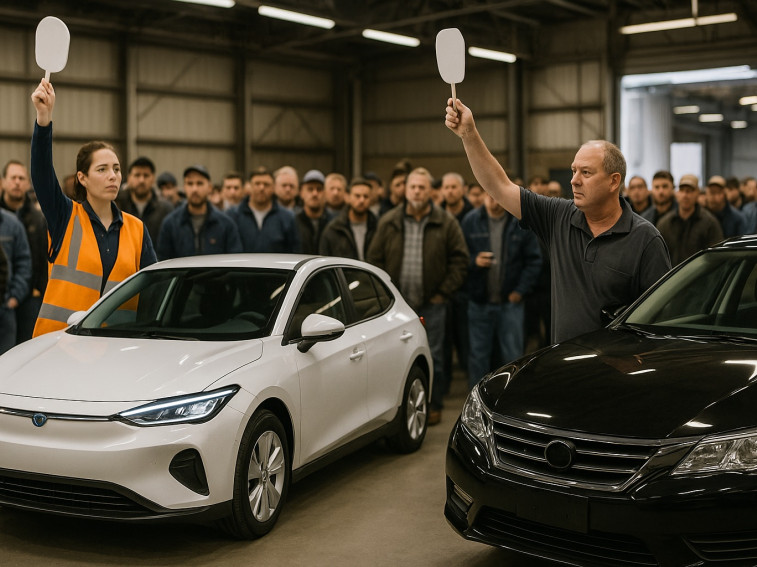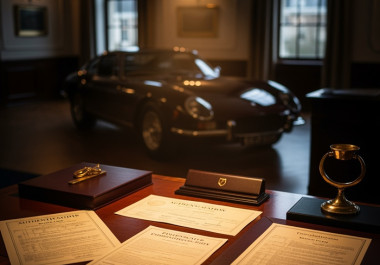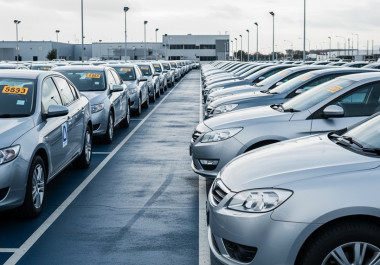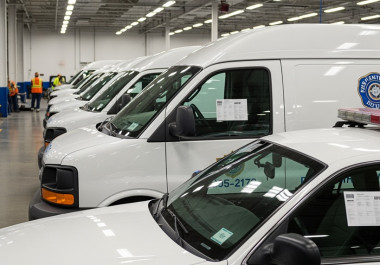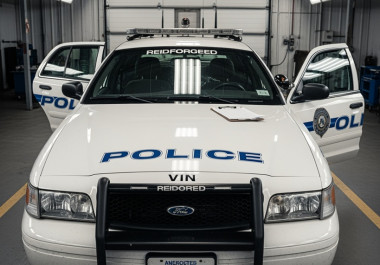It’s the question on every dealer's lips and every car buyer's mind: is the age of the petrol car auction coming to an end? For decades, the roar of an engine was the sound of a good deal, but now a quiet hum is starting to take over. The rise of electric vehicles is more than a change in technology; it's a fundamental shift in what people want, and it’s happening faster than anyone expected.
EVs are no longer a quirky sideshow. They’re on the roads, in the news, and appearing more and more on auction lists. This has everyone in the trade wondering if they're watching the slow death of the old guard. Will electric vehicle auctions eventually push the familiar, fuel-powered sales into the history books?
The short answer is yes, eventually. The long answer is a whole lot more complicated. It’s not going to happen overnight, and there are a few big hurdles to clear first.
The State of Play: EVs in the Mix
Right now, a typical sale, whether it’s a physical event or an online platform like RAW2K, won’t have a separate "EV-only" section. What you’ll find is a handful of electric models sprinkled in with the usual petrol and diesel stock.
A three-year-old Nissan Leaf might be listed between a Ford Focus and a VW Passat. A Tesla Model 3 might pop up among ex-fleet executive cars. They are becoming a normal part of the mix, but they are still a small fraction of the total. Traditional car auctions still rule the day simply because there are vastly more used petrol and diesel cars on the road. For every one used EV that comes to auction, there are likely fifty or more petrol and diesel equivalents.
This mixed approach works for now, but it highlights the biggest challenge for EVs: they are a different beast, and buyers need to understand them differently.
The Elephant in the Room: The Battery
With a petrol or diesel car, the checks are second nature. Look at the mileage, listen for engine rattles, and check the service book for a cambelt change. With an EV, one thing matters more than anything else: the battery.
Understanding Battery Health
An EV’s battery is its heart. It’s the most vital and expensive part, and its health fades over time. This is known as "State of Health" (SOH), measured as a percentage of its original capacity. A brand-new EV is at 100% SOH. A five-year-old one, having undergone several hundred charging cycles, might be down to 90-95%.
Why is this so critical? A battery with lower SOH holds less charge, which means less range. A car that could do 150 miles when new might only manage 120-130 miles a few years later. A 10% drop in battery health can wipe over £1,000 off the car's value.
The problem is, checking the SOH isn’t as simple as looking under the bonnet. It needs specialist diagnostic tools to get an accurate reading. This is a huge barrier for auction buyers used to making quick decisions based on a visual check and the sound of the engine.
The Supply Problem: Waiting for the Flood
The other big reason there aren't dedicated electric vehicle auctions every week is simple: there aren't enough used ones to go around yet.
The big boom in new EV sales, which saw over a quarter of a million new EVs registered in the UK in a single year, is fairly recent. Most of those cars are still with their first owners or on their first three-year lease. The supply of used EVs trickling into the auction system is just that—a trickle.
Think of it like waiting for a good pint of Guinness to settle. You can see the dark stuff in the glass, and you know it’s going to be great, but you can’t rush it. It needs time. The used EV market is the same. The cars are coming, but the process can't be hurried. The market will probably need to wait until 2025 and beyond to see the real flood of three- and four-year-old EVs coming off lease and hitting the auctions in big numbers.
A Cautionary Tale: The Dealer Who Laughed at a Leaf
There's a story that does the rounds in the trade about a dealer at an auction a few years back who saw an early 24kWh Nissan Leaf come through. It was one of the first proper EVs to hit the UK. He laughed. "Who's going to buy that?" he said. "The battery will be shot, and you can't drive it further than the end of your street." He let it go for peanuts, probably under £4,000.
Fast forward to today, and that same dealer is desperately trying to buy every decent used EV he can find. He now knows that even those older Leafs hold their value surprisingly well if the battery is healthy, often fetching £6,000-£7,000. He missed the boat because he judged new technology by old standards. It’s a lesson a lot of people have had to learn the hard way.
The Tipping Point: What Needs to Happen?
So, when will the balance shift? When will electric vehicle auctions become the main event? A few things need to fall into place.
-
A Surge in Supply: The market needs that wave of ex-lease and fleet vehicles. When big companies that bought tens of thousands of EVs in 2021/22 start replacing them, that’s when the volume will arrive.
-
Standardised Battery Testing: The industry needs a simple, reliable way to test and display a battery's SOH. When an auction can list a car with a "Certified 92% Battery Health" score, buyer confidence will soar.
-
Buyer Education: The average car buyer needs to get as comfortable with kilowatt-hours (kWh) and charging speeds (e.g., 7kW AC vs 100kW DC) as they are with miles per gallon (MPG). It's happening, but it will take time.
-
Government Deadlines: The 2030 ban on new petrol and diesel car sales is the big one. As that date gets closer, the focus of the entire motor trade will inevitably swing towards electric.
What This Means for Buyers and Sellers Today
Whether buying or selling, a smart approach to EVs in the current mixed market is crucial.
For Buyers
Anyone looking at an EV at the vehicle auctions needs to do more homework.
-
Check the Battery Warranty: Most makers offer a separate, longer warranty on the battery, often for 8 years or 100,000 miles, guaranteeing it won't drop below a certain SOH (usually 70%). A car might be out of its main 3-year warranty, but the battery could still be covered.
-
Look for a Health Report: Some sellers, especially specialist dealers, might provide a recent battery health report. This is gold dust if it's available.
-
Understand the Model: A 2019 Renault Zoe R110 has a different real-world range (around 150 miles) and battery size (41kWh) than a 2021 Zoe R135 (around 220 miles, 52kWh). A bit of research on the specific model goes a long way.
For Sellers
For anyone looking to auction your car, if it’s an EV, information is your best friend.
-
Be Honest About Range: Provide realistic figures for the car's real-world range. For example, "Achieves 180 miles in summer, closer to 140 in winter."
-
Get a Health Check: If possible, investing £50-£100 in a battery health report from a specialist could add hundreds to the final sale price.
-
Show the History: A full service history is still important, as it shows the car’s other systems, like brakes, suspension, and cooling, have been looked after.
Final Thoughts: It’s Not If, But When
So, will electric vehicle auctions overtake their petrol-powered counterparts? Without a doubt. Every sign is pointing in that direction. The government, the manufacturers, and a growing number of buyers are all pushing for an electric future.
But it won’t be like flicking a switch. Traditional car auctions will be a major part of the scene for years, simply because of the 30 million-plus petrol and diesel cars already on the roads. The shift will be a gradual, rumbling change over the next decade. But make no mistake, it is happening. The quiet hum is getting louder every year.
